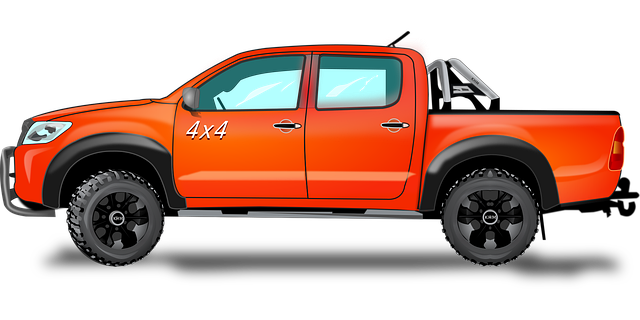Receiver hitches in McAllen secure trailers to trucks' chassis, handling intense towing forces. Choosing the right hitch, compatible with your truck's suspension system, enhances safety and performance on diverse terrain. Installation involves preparing the suspension, locating secure mounting points, installing the hitch base, attaching the receiver hitch, and testing for stability. Regular maintenance is crucial; inspect hitches for corrosion or damage, ensure proper security, and avoid overloading trailers. Following these steps guarantees a safe towing experience tailored to McAllen's varied driving conditions.
If you’re a McAllen truck owner looking to enhance your towing capabilities, receiver hitches are an excellent option. This article provides a comprehensive guide to understanding and utilizing these versatile attachments. We’ll explore how your truck’s suspension in McAllen plays a key role in installation, delve into different hitch types, and offer step-by-step installation and maintenance advice for area residents.
- Understanding Receiver Hitches: A Basic Overview
- The Role of Truck's Suspension in Receiver Hitch Installation
- Types of Receiver Hitches and Their Applications
- Choosing the Right Receiver Hitch for Your Truck in McAllen
- Installation Process: Step-by-Step Guide for McAllen Residents
- Maintenance and Safety Tips for McAllen Truck Owners Using Receiver Hitches
Understanding Receiver Hitches: A Basic Overview

Receiver hitches are an essential component of a truck’s suspension system in McAllen. They serve as the attachment point for trailers, allowing vehicles to tow heavy loads efficiently and safely. Understanding these hitches is crucial for any driver or vehicle owner looking to enhance their towing capabilities.
A receiver hitch is typically located at the rear of a pickup truck or similar vehicle, integrated into its chassis. It consists of a metal tube or bar with a specific coupling mechanism designed to secure a trailer’s tongue or ball mount. The hitch’s strength and durability are vital, as they bear the brunt of the towing force. In McAllen, where varying terrain and road conditions are common, a well-chosen receiver hitch can significantly improve the overall driving experience when towing.
The Role of Truck's Suspension in Receiver Hitch Installation

The truck’s suspension in McAllen plays a significant role in the successful installation of a receiver hitch. A well-designed and properly functioning suspension system ensures stability and balance while towing, distributing the weight evenly across the vehicle. This is crucial for preventing damage to both the truck and the trailer during transport.
In McAllen, where varying terrain conditions are common, a robust suspension system can accommodate bumps and road irregularities, maintaining control and ensuring a smooth ride. When installing a receiver hitch, it’s essential to consider the suspension’s capabilities to ensure proper alignment and secure attachment points. This guarantees that the hitch will not only withstand the forces of towing but also enhance safety for both the driver and the trailered load.
Types of Receiver Hitches and Their Applications

Receiver hitches come in various types, each designed for specific applications and tailored to meet unique needs. One common type is the class I hitch, which is a simple and lightweight option often used for towing smaller trailers or boats. Ideal for everyday use, these hitches integrate seamlessly with a truck’s suspension system in McAllen, providing stability and control during tow.
For heavier-duty tasks, class II and class III hitches are preferred. These advanced models offer increased weight capacity and additional features like swiveling capabilities, making them suitable for towing larger vehicles or heavy equipment. Their robust design ensures a secure connection between the truck and trailer, enhancing safety while navigating through different terrains in McAllen’s diverse landscape.
Choosing the Right Receiver Hitch for Your Truck in McAllen

When choosing the right receiver hitch for your truck in McAllen, understanding your truck’s suspension system is key. The compatibility between your vehicle’s frame and the hitch mounting points is crucial to ensure a secure and stable installation. McAllen’s diverse terrain requires robust hitches designed to withstand regular use while maintaining alignment with your truck’s suspension.
Consider factors such as the weight capacity of the hitch, the type of ball mount, and the overall construction quality. A well-fitted receiver hitch not only enhances towing capabilities but also preserves the integrity of your truck’s suspension in McAllen’s varied driving conditions.
Installation Process: Step-by-Step Guide for McAllen Residents

To install a receiver hitch on your truck’s suspension in McAllen, follow these step-by-step instructions.
1. Prepare Your Truck: Ensure your truck’s suspension is clean and free from any debris. Remove any items or accessories that might interfere with the installation process. This will ensure a smooth and secure fit for your new receiver hitch.
2. Locate the Ideal Mounting Point: Identify the optimal location on your truck’s frame where the receiver hitch will be securely attached. Most trucks have designated mounting points, but if not, consult your vehicle’s manual or seek advice from a professional mechanic in McAllen to avoid damaging any critical components of your suspension system.
3. Install the Hitch Base (First Stage): Using the appropriate tools, attach the hitch base to the selected mounting point on your truck’s frame. Tighten the bolts securely, ensuring they are properly torqued according to the manufacturer’s guidelines. This will serve as the foundation for your receiver hitch.
4. Attach the Receiver Hitch (Second Stage): Once the base is firmly in place, connect your desired receiver hitch to the base using the supplied hardware. Align the hitch with the base and secure it tightly with the provided bolts. Double-check all connections for stability and security.
5. Test and Adjust: Before attaching any trailers or accessories, test the functionality of your new receiver hitch. Ensure it is level and stable. Make any necessary adjustments to maintain proper alignment and balance.
Maintenance and Safety Tips for McAllen Truck Owners Using Receiver Hitches

For McAllen truck owners using receiver hitches, regular maintenance and adherence to safety guidelines are paramount. Ensure your truck’s suspension in McAllen is in optimal condition before attaching any hitch system. Worn or damaged components can compromise stability during towing, leading to dangerous situations on the road. Inspect the hitch ball mount, ball itself, and the wiring harness for any signs of wear, corrosion, or damage.
Properly securing the hitch is also crucial. Always use the recommended safety pins or lock mechanisms to prevent the hitch from coming loose while driving. Additionally, double-check that the connected trailer’s weight is within your truck’s towing capacity. Overloading can stress the suspension and components, increasing wear and tear and potentially leading to accidents. Regular maintenance and compliance with safety protocols will ensure a smoother, safer experience for you and your vehicle.
Understanding your truck’s suspension in McAllen is key when selecting and installing a receiver hitch. By choosing the right type for your needs and following proper installation and maintenance guidelines, you’ll ensure a safe and secure towing experience. Remember to regularly inspect your hitch and keep it well-maintained to withstand the challenges of McAllen’s diverse driving conditions.



